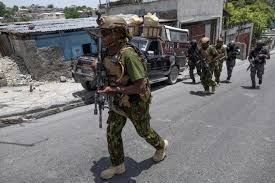

The Haitian National Police
and the Multinational Security Support Mission (MSS) have denied claims of
strained working relationships.
They also denied there was
bad blood between the two agencies fighting gangs that are terrorizing locals.
MSS commander Godfrey Otunge
said in a statement on Sunday that the PNH and the MSS always plan and conduct
police operations jointly on the ground, according to the mandate of the
Multinational Security Support Mission, which aims to support the Haitian
National Police in the fight against gangs in Haiti.
“Furthermore, regarding the allegations that Kenyan police officers accuse their PNH counterparts of colluding with gangs, which sometimes weakens operations, the Haitian National Police and the Multinational Security Support Mission wishes to categorically call upon the local population not to be intoxicated by this misinformation and manipulations that are only aimed to discredit the good work the two joint forces are doing to the advantage of the criminal gangs.”
“Equally important is to inform the local and
international community that the Haitian National Police and the MSS teams work
harmoniously, cooperate and coordinate very well as two professional teams to
ensure that the Haitian people enjoy peace in the country,” Otunge said.
He added the propaganda and misinformation
that are being orchestrated will not divert the attention of the PNH and the
MSS on the fight against gangs, especially when they are entering into decisive
operations in the coming days.
“The PNH and the MSS will continue to work
together to ensure the security of the Haitian population while reiterating
their determination to fight armed gangs to their last entrenchments,” he
added.
The developments came after
reports indicated there were bad working relationships among some officers on the
ground which can compromise the operations.
Kenya has deployed about 400 officers since June to lead the MSS, which is meant to comprise around 2,500 personnel from about 10 countries, but the force has been hobbled by funding and staffing shortfalls.
Only a handful of officers from other countries have arrived in Haiti. A pledge in October by President William Ruto to send another 600 officers the following month did not materialise.
This is due to various
challenges including ongoing violence on the ground that has grounded
operations at the main airport in Port-au-Prince.
The additional troops are
ready to be deployed anytime, officials said.
Gang violence that has killed thousands across
Haiti over the past two years has worsened recently, with armed groups
spreading last month into some of the last parts of the capital Port-au-Prince
that were not already under their control.
The UN-backed mission receives funds voluntarily from donor countries through a trust fund. However, the failure of donor countries to fulfil their promises has led to logistical challenges for the Kenyan officers in the Caribbean nation.
Gang violence in the
Caribbean nation has disrupted many services including flights.
Kenya police landed in Haiti in June 2024 and have managed to liberate a number of places including the airport, port, hospital and main roads.












